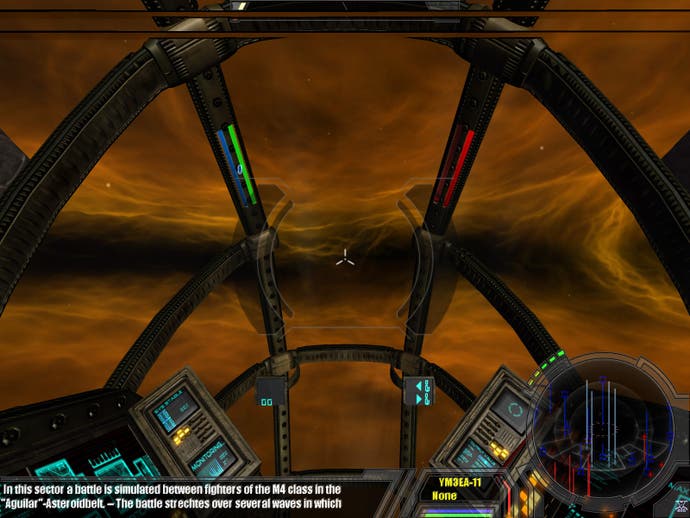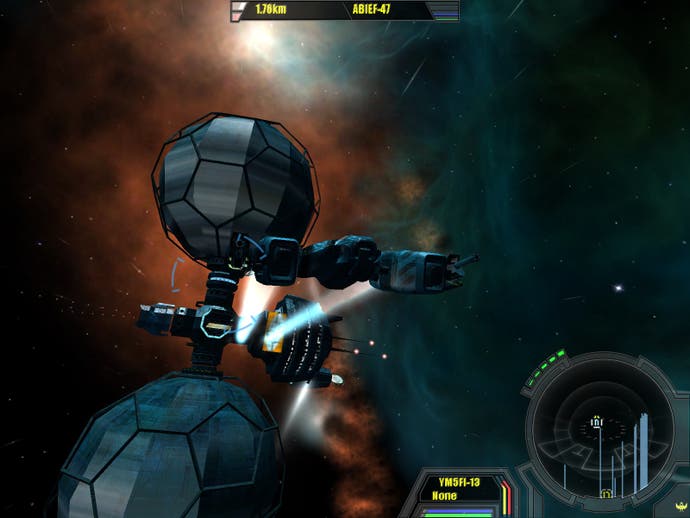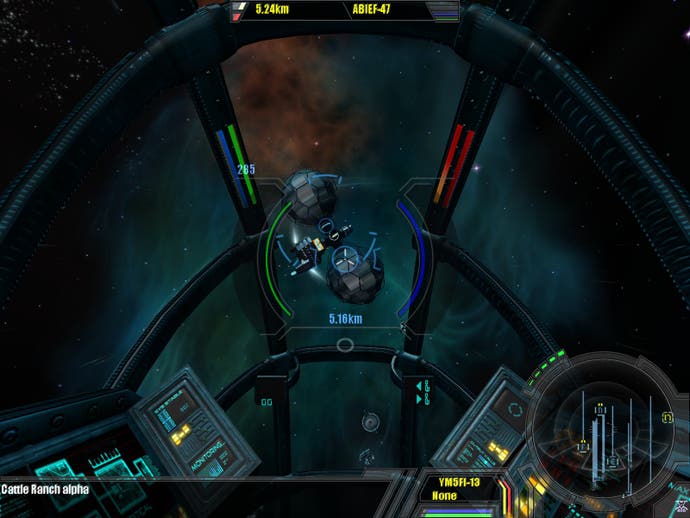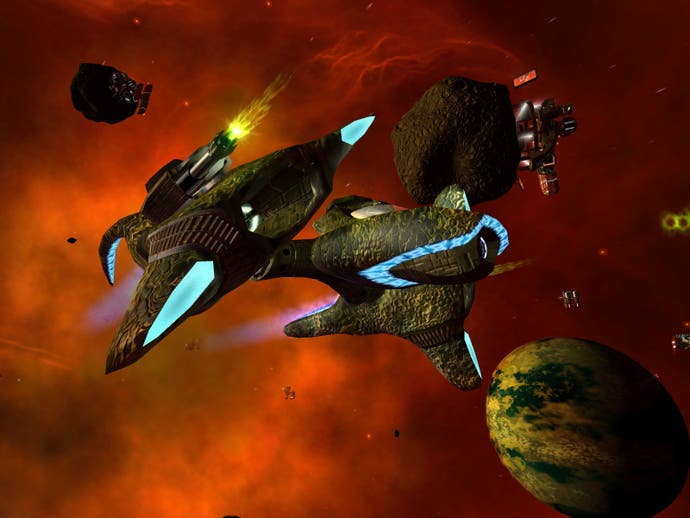X2: The Threat
It wants to be Elite.
If there's one piece of apparel you're sure to find in the ensemble of even the most fashion-challenged gamer, it's a nice pair of rose-tinted spectacles - to be used mostly when considering the videogames of yesteryear, particularly those which have become embedded in our minds as the games which defined our "youth". Such as it was.
One such classic of times past is certainly Elite - and there are probably few games for which the rose-tinted glass gets dragged out more often. Any discussion about what games you'd like to see made simply isn't complete without someone saying "they should do a proper remake of Elite," an outburst to be followed by wistful sighing and sage nodding from the entire group. Elite, it could be argued, is the shining light of retro gaming - perhaps the one old game which simply has not been bettered by a modern take on the same genre, and hence something of a sacred cow to, well, just about any gamer over the age of twenty.
Beyond Beyond The Frontier

It's quite apparent from the outset that the design discussion for Egosoft's ambitious follow-up to X: Beyond The Frontier started off with the line "we should do a proper remake of Elite," and that's been the team's goal right throughout development. X2: The Threat is a game which sets out to combine space combat and navigation with trading in much the same way that Elite did, but with the addition of a couple of decades worth of advancement to game design and technology. As with Elite, you start out with a low-spec ship and a few credits to your name, and from the outset, it's possible to simply go and play in a vast universe full of opportunity and danger.
This time, however, the universe is a lot more complex and advanced than the relatively simple affair presented in Elite. Egosoft has set out to create a vast, sprawling game world with an intricate and perfectly simulated economy, and in this effort the developer has been hugely successful. The enormous universe available to you in X2 is hugely impressive in terms of scale, but even more impressive in terms of detail - beautifully realised and staggeringly complex, it provides you with an economy where you can play around to your hearts content and actually see the effects that your actions have on the universe as a whole.
What's more, the team has given you massive freedom to play within this universe. Unlike Elite, you are not restricted to a single ship; it's possible to acquire additional ships and order them around, while you fly your main craft, so for example you can set them running on trade routes to earn cash, or have them fly as wingmen for you in tricky situations. You can even purchase factories and build up a corporate empire of your own - there's very little limit to what can be achieved in the game, and the early stages of gameplay will often have you gawping at the incredible ships and stations that inhabit the star systems, while later in the game you'll be able to own and command those very ships and stations.
To top it off, the game looks absolutely fantastic, and has to be one of the most graphically gorgeous representations of space we've ever seen. Everything is bump mapped and realistically lit, with harsh black shadows falling across objects and a wide selection of diverse and interesting ship and station designs for the various different races and sectors of space in the game. The downside is that it's an extremely power-hungry game and if you have a PC that's fallen much behind the cutting edge, performance will be dodgy to say the least. For a new PC, however, this is a game that will really show off the capabilities of all that expensive new hardware.
Economically Sound

All of this is very impressive indeed, and Egosoft is to be commended highly for creating such a fantastically ambitious and beautifully realised game world. Unfortunately, however, it's likely that most people who play X2 will never get to see very much of that world - because for all the thought that's gone into creating such an incredible playground, the developers seem to have forgotten to actually devise a decent game to play there.
As previously mentioned, you start the game (after a fairly hackneyed cut-scene involving your arrest for the theft of a spaceship and subsequent rehabilitation thanks to a military officer who takes an interest in you) with a fairly puny ship. In order to give the game some structure, there are a series of missions to be undertaken, which will get you exploring the local galaxy and earning some credits, but right from the outset you're also encouraged to get involved in trading yourself, and keen business minds will soon be working out the best trade routes both within the local systems and between different systems.
There are also a variety of other missions which can be undertaken by gaining in rank and then accepting missions from characters at the various space stations - these are quite varied, ranging from delivery missions through to races, search and destroy missions and a host of other types in between. However, it's clear very quickly that these missions are merely a distraction - the main meat of this game lies in trading or fighting, with even the running plot (yes, there is one, although the degree to which you decide to follow it is up to you) taking a back seat to the basic Elite-style gameplay mechanics.
The problem is that those gameplay mechanics actually aren't a lot of fun. The game is full of problems which start to grate very quickly indeed - ranging from a host of interface issues through to a poorly conceived flight model and right up to the biggest bugbear of all - namely atrociously poor pacing which frankly offers very little reward for enormous amounts of time invested in the game.
Free as a Bird

The first thing you're likely to have trouble with is the interface to the game, which frankly hasn't been thought out particularly well at all. X2 is an extraordinarily complex game which requires you to interact with a range of systems - trading, navigation, combat, and communications, to name but a few of the most obvious ones - and as such, the interface needs to be intuitive and helpful. Sadly, it is neither - with relatively obscure keyboard shortcuts being the order of the day for the majority of operations, and even after tens of hours in the cockpit, as it were, the mechanisms for controlling relatively simple operations feel clunky and awkward.
A difficult menu system might be more forgivable if the flight system itself weren't so flawed, but, sadly, the extra time that Egosoft apparently took to work on the flight and combat systems hasn't really paid off. Whether using a mouse or a joystick to navigate (a joystick is definitely preferable), there's an inaccuracy to the controls that leaves your ship drifting around in space and makes combat quite a chore early in the game. Things improve somewhat later on, but the clunky interface suggests that Digital Anvil's supremely polished (if less ambitious) Freelancer never happened, while the dull and frustrating space combat gives you the impression Freespace never happened.
Both of those problems are frustrations which many gamers would probably be willing to deal with if X2 was delivering on its promise of providing the sort of interaction with its stunningly realised universe that we were hoping for - but unfortunately, it's this that sounds the death knell for the game for the majority of players, we fear. While the latter stages of the game are certainly fascinating, and the ability to watch the effects of your actions on the economy of the galaxy as you build a genuine interstellar business empire is quite unique to this genre, the sad fact is that you're going to have to persevere on low-end trading milk runs for a very, very long time before you get to see any of that.
In space, nobody can hear you snore

In fact, you're probably looking at a good thirty to forty hours of gameplay before you start to touch on the high-level possibilities of X2 - thirty to forty hours of running increasingly dull missions and trade runs and grappling with frustrating combat and a badly designed interface, before the things you really want to do in the game start to present themselves to you. In terms of pacing, this is slower progress than a lot of MMORPGs offer - and given the notorious "level grind" mentality behind those games, that's really saying something.
Herein lies the key issue with X2. While it's somewhat unprofessional for a reviewer to ponder why a developer decided to make a certain type of game rather than aiming for a different game entirely, an exception needs to be made here - because the question has to be asked, why isn't X2 a massively multiplayer game? Egosoft have gone to the trouble of modelling a complicated economy, creating an utterly huge game environment, and designing a game around the idea of very gradual levelling-style progression; they've even built in a fame system which gives you access to new missions as you progress, and the concept of corporations owning factories and independently piloted ships working together. However, having created all of this, they then went and populated this game with one player only - and without the ongoing social hook of a massively multiplayer game, that quickly wears thin.
X2 is a superbly ambitious game which achieves much of what it sets out to do, but the fact of the matter is that the Elite sacred cow needs to be led to the slaughter. This is, to a large degree, a faithful reproduction of Elite gameplay, brought to life in a modern game, but that gameplay simply hasn't stood the test of time, and ignoring the obvious genre high water marks such as Conflict Freespace doesn't help in the slightest either.
Egosoft desperately needs to think very hard about where they want to go with these games - as an MMORPG, X2 would be a much more interesting proposition, but as a single-player game, it's definitely one for the hardcore fans only.

